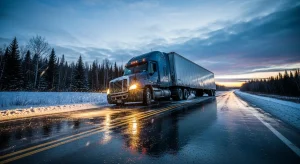Updates on the U.S. trucking industry: extreme weather, autonomous trucking legislation and a trucker battle against the FMCSA.
State of Emergency Due to Winter Storms and Wildfires in the U.S.
Vermont and Iowa are under emergency declarations due to the Blair winter storm. In Vermont, the emergency, valid until February 5, has been declared due to a shortage of residential and commercial heating fuel, allowing propane and heating oil suppliers to operate with fewer restrictions. However, those with out-of-service orders are not eligible for this relief. In Iowa, high demand for petroleum products has created difficulties in supplying propane and other fuels, leading to the exemption of hours-of-service requirements for drivers delivering heating fuels until February 6.
Other states, such as Kentucky, Missouri, and New York, have also relaxed some regulations for commercial vehicles due to the storm. Meanwhile, in Southern California, wildfires have prompted evacuations in Los Angeles County, but no emergency orders have been issued related to commercial vehicles.
The emergency measures in Iowa also include exceptions related to agriculture and avian flu, and stipulate that drivers must rest for 34 consecutive hours after their workday to restart their hours of service.

Indiana and Montana: Regulations for Autonomous Trucks
The use of autonomous trucks has once again become a topic of debate in the legislatures of various U.S. states, highlighting concerns about road safety and employment impacts. States like Indiana and Montana are continuing to evaluate legislation for these vehicles, with some doubts and many opinions.
In Indiana, lawmakers are reviewing legislation that would establish guidelines for the use of autonomous trucks on state roads. The proposal aims to require that autonomous trucks transporting goods or passengers have a human operator present in the vehicle, imposing a $500 fine for non-compliance. This proposal stems from a lack of regulation regarding autonomous truck technology, which could increase the risk of accidents due to technological failures. Additionally, there are fears that the advancement of these vehicles could negatively impact employment in the state.
In Montana, the Legislative Assembly is also considering a bill to regulate autonomous trucks, focusing on allowing the use of truck platooning. The bill, HB97, specifies that the driver of the lead vehicle in a platoon must have a CDL and be prepared to take control of the truck in case of an emergency. This bill focuses on partially or fully autonomous vehicles, such as trucks, trailers, and tractor heads, and requires the Montana Department of Transportation to adopt rules to regulate platooning, especially in hazardous road conditions.
The Montana Department of Transportation has warned that testing and deploying these technologies in a state like Montana could be more complicated than in other states. This type of legislation reflects growing interest in autonomous vehicle technology, although it also highlights concerns about its impact on safety and the local economy.

Truckers Demand Justice from FMCSA Regarding Transparency Proposal for Brokers
Truckers are demanding justice from the Federal Motor Carrier Safety Administration (FMCSA), with over 2,000 comments submitted regarding its proposal for transparency for brokers. Many truckers are reporting practices such as double brokering and scams, where intermediaries fail to pay carriers. Additionally, they are asking the FMCSA to enforce transparency regulations that have been in place since 1980 but, according to the truckers, have not been respected by brokers.
The president of the Owner-Operator Independent Drivers Association (OOIDA) highlights that the main issue is the lack of transparency in the agreements between truckers and brokers. OOIDA is organizing efforts to ensure the FMCSA receives a wide range of comments before making any decisions.
The proposal aims to address these concerns without the need for new regulations, as transparency rules have been in place for decades, but brokers have not complied, according to the truckers. The FMCSA will accept comments on the broker transparency proposal until January 21.


Frozen Roads After Bomb Cyclone: Black Ice, Record Snow and High Risk for Trucks
Frozen roads continue to disrupt freight transportation following the impact of a powerful bomb cyclone, leaving behind black ice, highway shutdowns, power outages, and dangerous winter driving conditions stretching from the Gulf Coast to New England.

Lunar New Year 2026: Ancient Traditions, Renewed Energy, and Massive Celebrations
Lunar New Year 2026 begins on February 17 under the sign of the Fire Horse and is marked by spiritual rituals, family reunions, and large-scale celebrations in both China and the United States, especially in California.

Freedom 250 Grand Prix: How Logistics and Transportation Will Power the Race in Washington
The first-ever IndyCar street race in Washington, D.C., scheduled for August 21–23, will headline the United States’ 250th anniversary celebrations — and it will trigger a massive transportation, freight, and urban logistics operation behind the scenes.

Groundhog Day: What It Means for Trucking When “Phil Sees His Shadow”
The forecast from America’s most famous groundhog is calling for more winter — and that’s an important signal for the trucking industry and cold-season route planning

Love on the open road: the best dating apps for truckers
If you’re looking for someone to go the long haul with, here are the best dating apps for truck drivers. They say love is everywhere…

The most congested cities in the U.S. and the world in 2025
The annual TomTom Traffic Index produces a ranking of the most congested cities in the world. The annual TomTom Traffic Index presents an analysis of
